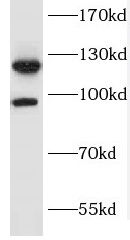Products
FGFR2 antibody
Category:
Research Area:
- SPECIFICATIONS
- Product Name
- FGFR2 antibody
- Catalogue No.
- FNab03102
- Size
- 100μg
- Form
- liquid
- Purification
- Immunogen affinity purified
- Purity
- ≥95% as determined by SDS-PAGE
- Clonality
- polyclonal
- Isotype
- IgG
- Storage
- PBS with 0.02% sodium azide and 50% glycerol pH 7.3, -20℃ for 12 months(Avoid repeated freeze / thaw cycles.)
Immunogen
- Immunogen
- fibroblast growth factor receptor 2
- Alternative Names
- BEK antibody, KGFR antibody, KSAM antibody
- UniProt ID
- P21802
- Observed MW
- 120 kDa, 85-92 kDa
Application
- Tested Applications
- ELISA, WB, IF
- Recommended dilution
- WB: 1:500-1:2000; IF: 1:20-1:200
Validated Images
 A549 cells were subjected to SDS PAGE followed by western blot with FNab03102(FGFR2 antibody) at dilution of 1:300
A549 cells were subjected to SDS PAGE followed by western blot with FNab03102(FGFR2 antibody) at dilution of 1:300
- Background
- Tyrosine-protein kinase that acts as cell-surface receptor for fibroblast growth factors and plays an essential role in the regulation of cell proliferation, differentiation, migration and apoptosis, and in the regulation of embryonic development. Required for normal embryonic patterning, trophoblast function, limb bud development, lung morphogenesis, osteogenesis and skin development. Plays an essential role in the regulation of osteoblast differentiation, proliferation and apoptosis, and is required for normal skeleton development. Promotes cell proliferation in keratinocytes and immature osteoblasts, but promotes apoptosis in differentiated osteoblasts. Phosphorylates PLCG1, FRS2 and PAK4. Ligand binding leads to the activation of several signaling cascades. Activation of PLCG1 leads to the production of the cellular signaling molecules diacylglycerol and inositol 1,4,5-trisphosphate. Phosphorylation of FRS2 triggers recruitment of GRB2, GAB1, PIK3R1 and SOS1, and mediates activation of RAS, MAPK1/ERK2, MAPK3/ERK1 and the MAP kinase signaling pathway, as well as of the AKT1 signaling pathway. FGFR2 signaling is down-regulated by ubiquitination, internalization and degradation. Mutations that lead to constitutive kinase activation or impair normal FGFR2 maturation, internalization and degradation lead to aberrant signaling. Over-expressed FGFR2 promotes activation of STAT1.



